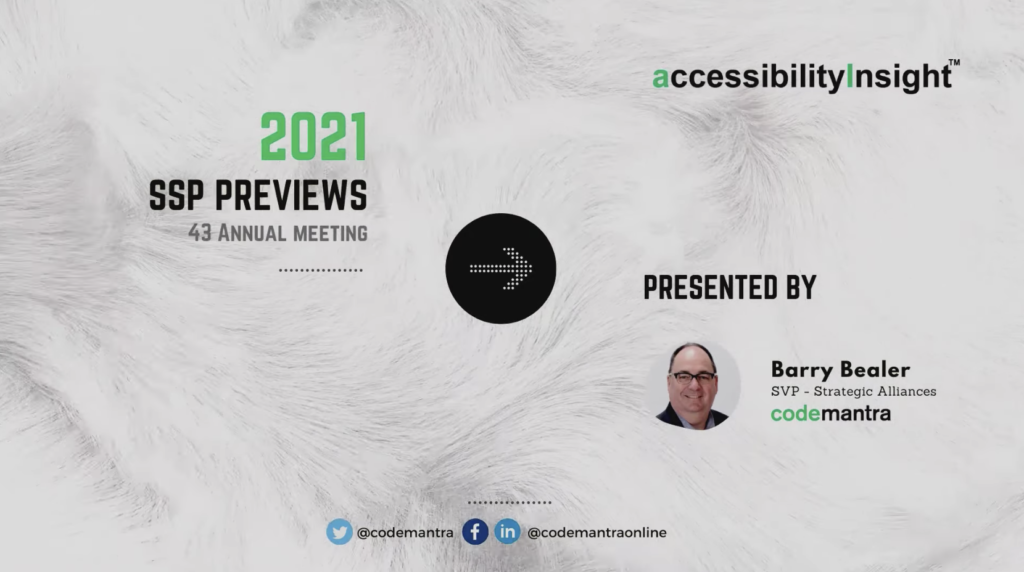June 9, 2021 – Mount Laurel, NJ – At the Society for Scholarly Publishing (SSP) 43rd Annual Meeting, held virtually on May 24-27, 2021, codemantra was awarded “Best Innovation” for “Using AI to Make Your Documents Accessible” during the SSP Previews Plenary: “New and Noteworthy Product Presentations.”
This lightning-round plenary offered the chance to learn more about the industry’s newest and most innovative products, platforms, and/or content in 5-minute, back-to-back presentations. Attendees left with exposure to a wide breadth of content on new and updated products of interest to the scholarly publishing community. After ten presentations, attendees were asked to vote for the product, platform, service, or content that displayed the most original or creative thinking.
 Barry Bealer, Senior Vice President of Strategic Alliances for codemantra, introduced viewers to accessibilityInsight™, an intelligent document processing platform that uses machine learning to automate up to 80% of document accessibility production to:
Barry Bealer, Senior Vice President of Strategic Alliances for codemantra, introduced viewers to accessibilityInsight™, an intelligent document processing platform that uses machine learning to automate up to 80% of document accessibility production to:
• help organizations become more inclusive
• transition to digital accessibility efficiently and affordably
• ensure legal compliance to all national and international standards
• extract information and properties from the document
• classify documents based on structure, for quick and accurate compliance
Additionally, SSP was pleased to offer scholarly posters as a new category of Annual Meeting presentations. Originally planned for 2020, these posters provide an avenue to share additional content with attendees, and can even lead to more in-depth and interactive exchanges of information than is possible in concurrent sessions. Meeting attendees were asked to vote on their favorite poster for “Best Content,” “Best Design,” and “Best All-Around.” The winners are:
Best Content
“An OKR Story: Objectives & Key Results at The MIT Press“
Gabriel Harp, The MIT Press
Originating in Silicon Valley, Objectives & Key Results (OKRs) form a prioritization framework that is seeing uptake in the ScholComm industry. The appeal is compelling: a framework that enables an organization to focus on its true priorities, to stretch itself, and to improve collaboration, communication, and engagement across the board. OKRs have been described as an “open-source” framework; there is no template, no patented approach. On the one hand, this flexibility lowers the bar to entry. On the other hand, success depends all the more on finding the right approach for your organization. This poster will present the experience of one organization—The MIT Press—including an overview of the approach we took and the highlights and challenges that we experienced.
Best Design
“The Journal of Ethics in Publishing from The George Washington University“
Gabrielle Bethancourt-Hughes, George Washington University
Lois Jones, American Psychological Association
John Warren, George Washington University
The Journal of Ethics in Publishing is a new, open-access journal that welcomes articles, case studies, and conference presentations from scholars, students, and publishing professionals on topics including, but not limited to, diversity and inclusion, accessibility, peer review, open access, sustainability, publishing metrics, equity, and other aspects and issues of ethics in publishing. We also welcome innovative forms of scholarship such as video or audio recordings, podcasts, or narratives. This online journal will be managed by students in the GW Publishing Master’s program.
Best All-Around
“Is Implicit Bias Impacting Your User’s Experience?“
Rachel Volentine, University of Tennessee
Implicit bias is the unconscious attitudes or stereotypes that manifest and affect our understanding, actions, and decisions. The publishing industry recognizes this and has been tackling bias issues affecting editorial boards, the peer review process, and authorship. The conversation is on-going and journals and publishers have made pledges to increase diversity and implement implicit bias policies. The actions, however, are mainly on reducing bias at the content and/or organization level which does not address how implicit bias may affect the reader. Existing tools and platforms may have an implicit bias that makes a positive user experience for some groups but provide a poor user experience for others. Scholarly publishing needs to ensure that diverse audiences are able to have rewarding user experiences across the many interfaces and products used to access and deliver their journals and content. Usability (or user experience) testing is one way to tackle the issue by ensuring that the diverse scholarly publishing audience—across gender, culture, geography, language, and discipline—is considered throughout the industry’s product lifecycle. This poster shows how usability testing addresses the potential for implicit bias in interface design and how these findings can be used to improve user satisfaction, increase and broaden readership, and foster trust resulting in an increased bottom line for the publishing industry.
If you missed the SSP Annual Meeting, you can catch the Previews Plenary and Poster Sessions in the SSP On Demand library in the coming weeks.
About the Society for Scholarly Publishing – SSP, founded in 1978, is a nonprofit organization formed to promote and advance communication among all sectors of the scholarly publication community through networking, information dissemination, and facilitation of new developments in the field. SSP members represent all aspects of scholarly publishing—including publishers, printers, e-products developers, technical service providers, librarians, and editors. SSP members come from a wide range of large and small commercial and nonprofit organizations. They meet at SSP’s annual meetings, educational seminars, and regional events to hear the latest trends from respected colleagues and to discuss common and mutual (and sometimes divergent) goals and viewpoints.
For more information, contact:
Melanie Dolechek, Executive Director | info@sspnet.org | 856-439-1385


Join the Conversation
You must be logged in to post a comment.